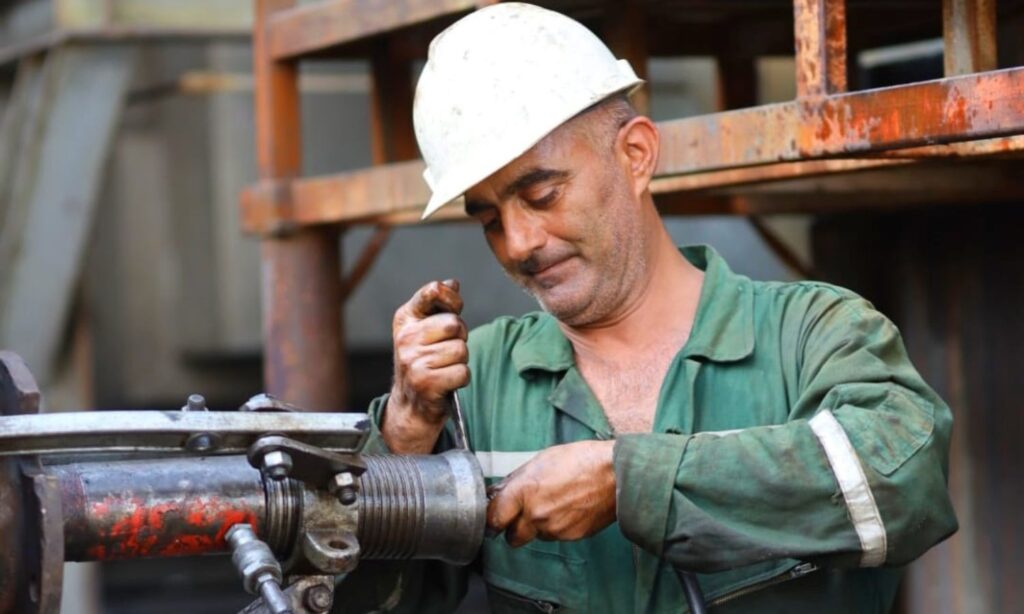The joy of the workers of the Baniyas Refinery with the new incentive system did not last for more than a month, when they woke up at the end of last January to the news of the suspension of the incentives upon which they had built many hopes.
Jaafar (a pseudonym for security reasons) from the countryside of Tartus and residing in the Baniyas Refinery housing, said that he received the incentives three times, twice at the end of December 2023 and once at the beginning of last January, with a value of 700,000 Syrian pounds each time, which made him feel a great happiness, as he was able for the first time in seven months to secure the needs of his family and to buy clothes for his children.
Jaafar (43 years old), who works in the hydrogenation department, one of the most difficult and dangerous departments in the refinery, said that he planned with his colleagues to reinstate the ‘collective lending circles’ system (an idea based on pooling money from colleagues every month and granting it to one person), and they started a new collective fund with an amount of 300,000 Syrian pounds monthly, and set the roles for obtaining it, before the cancellation of the incentives shattered their plans and ambitions.
“They experiment on us, no one cares about us and how we live; we are forced to work laborious jobs with salaries that are not even sufficient for our children’s food cost,” Jaafar concluded, confirming that working conditions are very tough, and they are not allowed to resign or take early retirement, and even vacations are very difficult to obtain.
Before the incentives, Jaafar’s salary and that of the majority of his colleagues did not exceed 200,000 Syrian pounds, as they were employees based on categories four and five.
Although Abbas (32 years old) works in the nitrogen department, he only received 415,000 Syrian pounds as incentives each time he received them for the months of September, October, and November 2023; he was happy in his heart with the good financial amounts that he got, which gave him the dream of the possibility of starting a family and getting married.
Abbas stated that he had filed a complaint because he did not get incentives similar to those of his colleagues, and his department head promised to improve them in the coming months, but today, the young man is back to square one, striving to get approval for resignation to travel and find a job opportunity in Iraq or Lebanon.
The administrations refuse to accept the resignation of state employees or even to grant them an unpaid long leave, turning the workplace into something like a prison, while many workers dream of obtaining resignation and finding a job opportunity in the private sector, where salaries are slightly higher compared to state employees’ salaries, whose minimum does not exceed 279,000 Syrian pounds after the last increase at the beginning of this February, while salaries of workers in the private sector reach about one and a half million Syrian pounds.
Will they go back to giving us 4000 pounds?
Salim (52 years old), who suffers from many diseases including allergies and back pain as a result of his many years of work in the bitumen and asphalt section of the Baniyas Refinery, said that he was not surprised by the decision to suspend incentives and the delay in granting them, because he was sure that such joy would not last, as they are just workers and not officials with neckties, to use his own words.
The man said that when he got his new incentives, the first thing he did was buy his complete medication, and visited the doctor to find a solution for his persistent back pain, but now with the suspension of incentives, he will have to stop treatment because he cannot afford its high costs, whether in terms of medication or consultation fees.
“Will they return to giving us 4000, or at best 5000 Syrian pounds as incentives, as they used to give us before the decision?” the man wondered, who seemed to be completely resigned to his fate like the majority of workers, who did not think about striking to push the government to backtrack on its decision to stop the incentives.
The salaries of the refinery workers used to be considered good before the year 2011, where the incentive ceiling was 9000 Syrian pounds, equivalent to about 180 US dollars (the dollar before 2011 was at 50 pounds, and today it is 14,650 pounds).
Despite the issuance of a decree granting incentives to state employees by up to 300% in 2022, it was never implemented even once, as the government continually announced its implementation in its ministries and institutions. The incentives for the workers of the Baniyas Refinery and the institutions of the Ministry of Oil were approved as of September 2023, before being halted at the end of January 2024.
The Minister of Administrative Development, Salam Saffaf, justified the decision to hesitate in granting incentives, saying it would lead to the wastage of public funds due to misunderstanding it.
She added that the goal of the decree was to direct attention to the active worker, on the principle of “the more you work, the more you earn,” noting that, in reality, the decree was associated with the issue of wage increases and improvement of the living situation, which was not foreseen when setting the goal of the decree.
The Syrian citizen faces waves of rising prices and the absence of the ability to secure the basic needs of his family, amidst the deterioration of the Syrian pound against foreign currencies, with no solutions emerging to pull him out of his successive crises.
The average cost of living in regime-controlled areas exceeds 10.3 million Syrian pounds, and the minimum cost of living is 6.5 million Syrian pounds.

